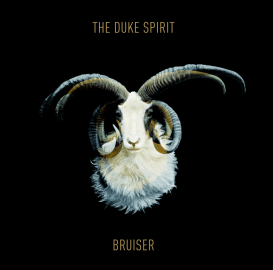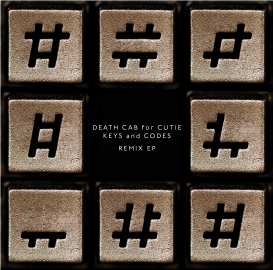Print Edition: December 7, 2011
Justin Bieber
Under the Mistletoe
It was inevitable, but that doesn’t make it less incredible. Justin Bieber’s new album has dropped, and so, apparently, have his, well…ahem… that prepubescent performer with those perfect pipes has now officially become post-pubescent. This is fairly evident in the new Christmas album, in which Bieber hums, warbles, and raps his way through eleven tracks, including such classics as “Silent Night” and “The Christmas Song (Chestnuts Roasting On an Open Fire).” While the album fails to become anything more than an overpriced microwave toy, the new depth is best displayed in Bieber’s collaboration with Busta Rhymes, in which the wonder child channels his seasonal soulmate, the little drummer boy: “Ra pum pum pum, Ra pum pum pum… / Playing for the king / playing for the title / I’m surprised you didn’t hear this in the Bible.” Hormones are a dangerous thing, Justin. Use them wisely.
The Duke Spirit
Bruiser
After a three-year hiatus, the London quintet The Duke Spirit returns with their third LP Bruiser, a record that is noticeably dreary and lacks the pace of their past releases. Falling in categorically with the femme-bluesy groups like the Kills and the Yeah Yeah Yeahs, The Duke Spirit does everything a modern rock band needs to do except understand that using dynamics does not constitute an identity. Their collection of forgettable songs all begin with either earnest drumming or a grimy bass riff, accompanied by sultry vocals, as the band succeeds in sucking the life out of almost every song by consistently overstaying their welcome. The album showcases a wealth of tedious jams, running an extra fifteen minutes, yet containing the same number of tracks as their superior 2008 release Neptune. There are indeed moments of lyrical thrust and excitement on Bruiser, with the passionate “Don’t Wait” and the band’s driving single “Surrender,” but the excitement soon passes, leaving fans to return to older Duke Spirit records to fill the empty void left by Bruiser.
LOOM
EPYLLION
Quiet minimalism, droning repetition and deadened introspection characterize EPYLLION, the exquisite, but dreary debut from Toronto’s Brooke Manning, stage name LOOM. The style is determinedly slow and meditative, with ceaselessly strumming guitars and sparing harp and keyboard overdubs sprinkled throughout. Manning’s delicate vocals are flawless, but dispassionate and not nearly as evocative as they need to be to carry the dead weight of the rest of the album. EPYLLION is but a cleverly disguised indie makeover of new age muzak, the scourge of the ‘90s. It makes itself out to be high art—self-important and grandiose—but it’s nothing special, just pretentious pabulum. The music itself is mostly harmless and agreeable, but something about the way it seems to demand to be taken seriously rubs me the wrong way. The only relief comes in the form of mid-album “Around Again,” which trades in the acoustic malaise for buzz-saw electric guitars. It’s exciting and shows all the difference variety can make.
Death Cab for Cutie
Codes and Keys Remix EP
The problem I generally have with Death Cab for Cutie is their tone: although some tunes are catchy as all hell, for the most part they seem to fall into a slow, sad groove that, while good for some moods, is depressing after a while. This album, a remix of Codes and Keys which dropped in March was therefore a pleasant surprise. It starts with a jazz beat of cymbals and snare, and continues on apace. Everything has an underlying jazz feel to it; by the third track, they’ve introduced piano elements to back up the drums. This combines with a thrumming baseline to tie the melodies together in a neat little catchy package. They lay off the distortion effects and a clean, jazzy, energetic album emerges – still laying claim to clever and poetic lyrics, which were Death Cab’s strength in the first place.





